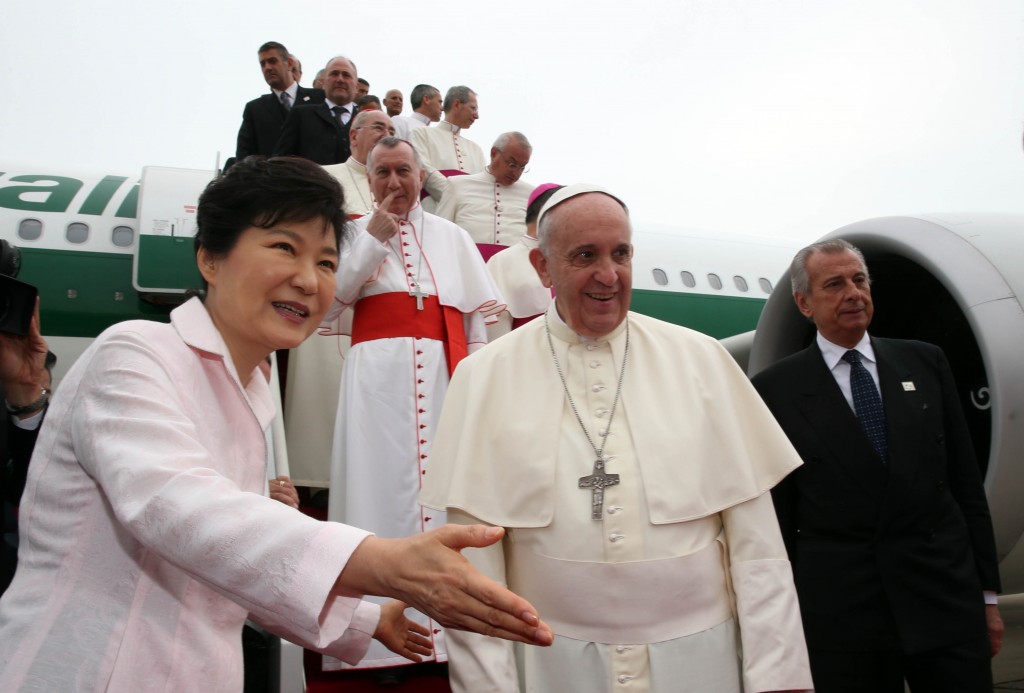- California Assembly OKs highest minimum wage in nation
- S. Korea unveils first graphic cigarette warnings
- US joins with South Korea, Japan in bid to deter North Korea
- LPGA golfer Chun In-gee finally back in action
- S. Korea won’t be top seed in final World Cup qualification round
- US men’s soccer misses 2nd straight Olympics
- US back on track in qualifying with 4-0 win over Guatemala
- High-intensity workout injuries spawn cottage industry
- CDC expands range of Zika mosquitoes into parts of Northeast
- Who knew? ‘The Walking Dead’ is helping families connect
Pope arrives in South Korea for 5-day visit

President Park Geun-hye personally greets the 77-year-old Argentine upon his arrival at an airport in Seongnam, just southeast of Seoul. (Yonhap)
SEOUL (Yonhap) — Pope Francis arrived in South Korea on Thursday (KST) for a five-day trip seen as a reflection of the Vatican’s emphasis on the small but growing Catholic flocks in South Korea and other Asian countries.
It is the pope’s first trip to Asia since he took over the papacy from his predecessor, Benedict XVI, in March 2013.
South Korean President Park Geun-hye greeted the 77-year-old Argentine upon his arrival at an airport in Seongnam, just southeast of Seoul.
Park is scheduled to hold an official welcoming ceremony at the presidential office later in the day before talks with the pope. Park and the pope also plan to deliver speeches later at a separate session in the presidential office, according to Park’s office.
Details of their planned speeches are not available, though Park is expected to touch on inter-Korean relations from a humanitarian perspective while the pope is expected to send a message of peace and one that advocates reconciliation on the Korean Peninsula.
Park and the pope “are likely to discuss humanitarian issues,” not political ones during their meeting, presidential spokesman Min Kyung-wook told reporters.
Among the highlights of the pope’s five-day trip are his participation in an Asian Catholic youth festival and a ceremony to beatify 124 Korean martyrs.
The Holy Father is also scheduled to meet students who survived the April 16 ferry disaster that claimed more than 300 lives and the victims’ families on his second day.
On his final day, the pontiff is to celebrate a Mass for peace and reconciliation on the Korean Peninsula at Seoul’s Myeongdong Cathedral and deliver a message of peace for the divided Koreas and East Asia.
Koreans have a distinctive history of Catholicism — the religion was introduced not by foreigners but by indigenous intellectuals and scholars who studied its teachings. But Catholics were persecuted for nearly a hundred years during the 18th and 19th centuries by Korean rulers who feared the religion’s rapid spread would undermine the nation’s Confucianism-based ruling ideology.
South Korea currently has more than 5.4 million Catholics, around 11 percent of the country’s 49 million population, according to figures from the church. In comparison, the share for the entire Asian continent is 3.2 percent. The number of South Korean Catholics has risen more than four-fold from around 1.3 million in 1980 to 5.4 million in 2013.












![일본 사도광산 [서경덕 교수 제공. 재판매 및 DB 금지]](http://www.koreatimesus.com/wp-content/uploads/2024/07/PYH2024072610800050400_P4-copy-120x134.jpg)


